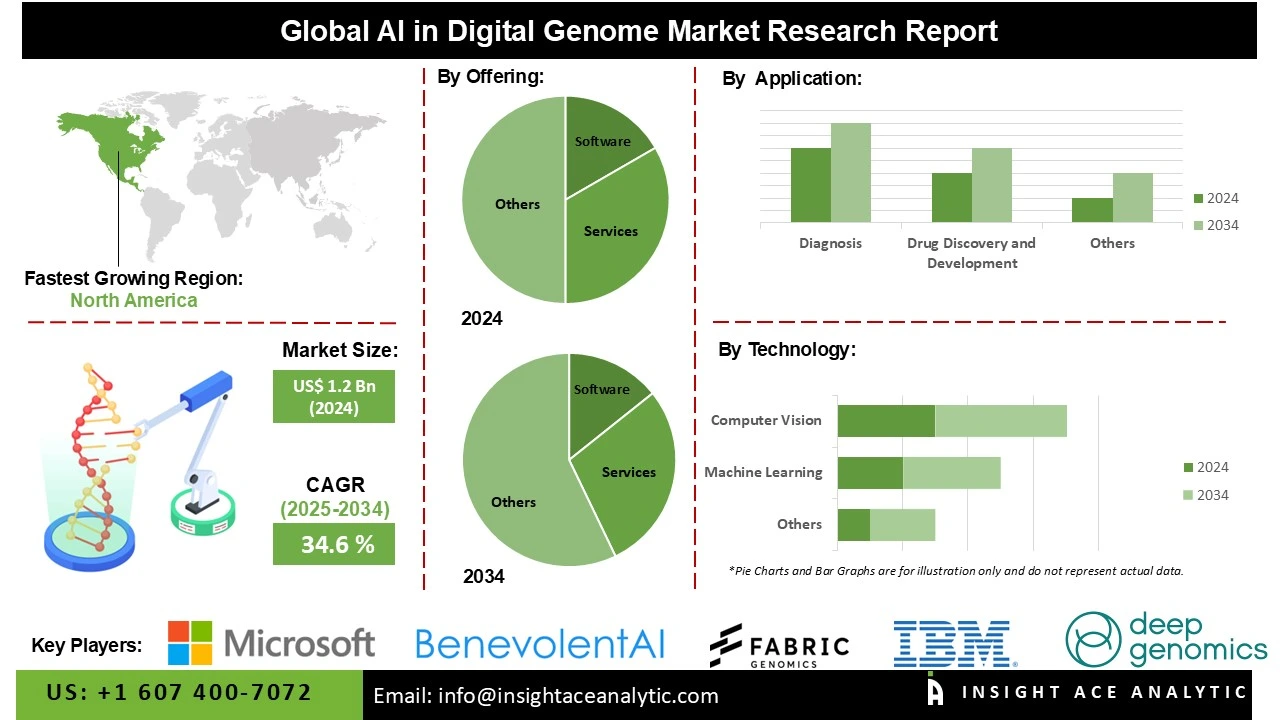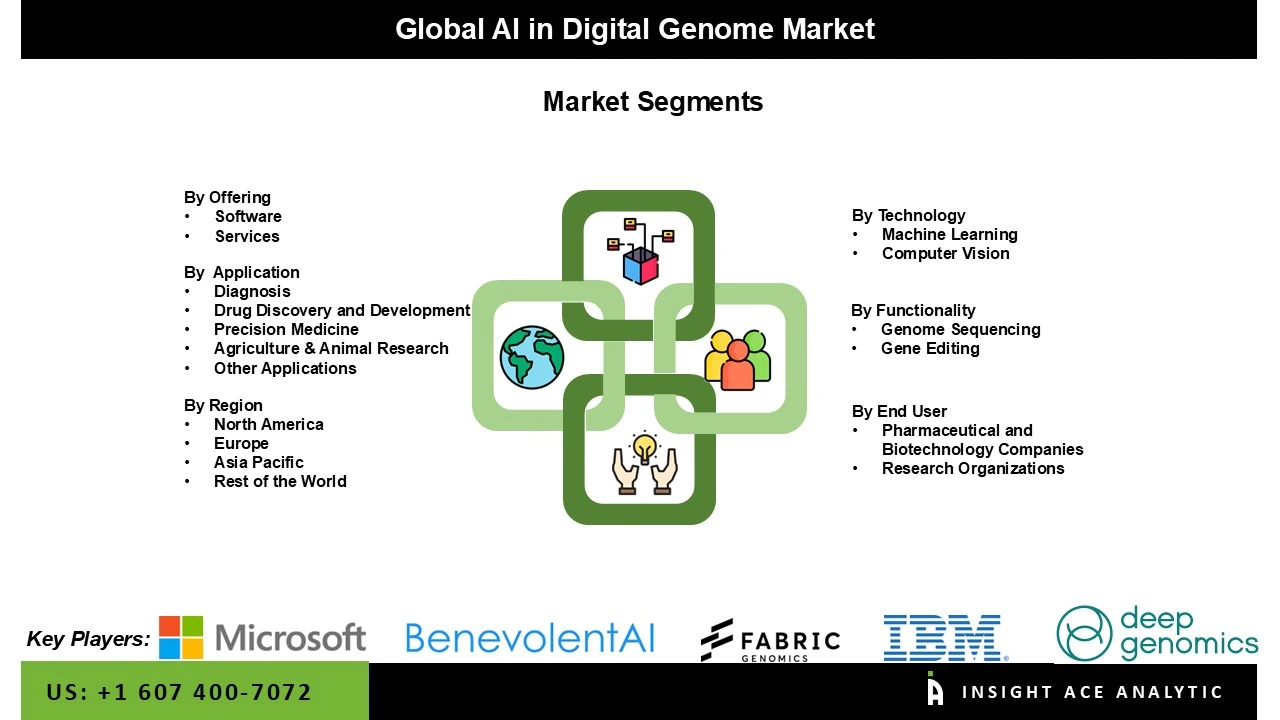AI in Digital Genome Market Size is valued at US$ 1.2 Bn in 2024 and is predicted to reach US$ 21.9 Bn by the year 2034 at an 34.6% CAGR during the forecast period for 2025-2034.

AI in digital genome refers to the use of artificial intelligence technologies to analyse, interpret, and manage vast genomic data, enabling faster insights into genetic variations, disease prediction, personalised medicine, and advanced biomedical research. The AI in the digital genome market is witnessing strong growth as healthcare systems become increasingly focused on personalised treatments. Artificial intelligence allows the rapid processing of large genomic datasets, accurately pinpointing genetic mutations and disease predispositions.
This function enables clinicians to tailor treatments to an individual's genetic makeup, thereby improving therapeutic outcomes while reducing toxicities. The increased adoption of artificial intelligence algorithms in genomics is meant to accelerate drug discovery processes and precision medicine strategies. As medical centres and research institutions adopt AI-based sequencing and interpretation tools, the demand for customised and cost-effective genomic solutions continues to drive global market growth.
The AI market in the digital genome sector is undergoing robust growth, primarily driven by the increasing prevalence of chronic diseases, including cancer, diabetes, and cardiovascular disorders. These conditions need quicker and more precise genetic analysis for early detection and personalized treatment. AI algorithms enable the rapid interpretation of massive genomic datasets, assisting in the identification of disease-linked mutations and predicting patient responses to therapies.
The integration of AI enhances accuracy, reduces analysis time, and lowers costs, making genome sequencing more accessible. The growing demand for precision medicine is significantly driving the adoption of AI-driven digital genome solutions worldwide.
Some of the Key Players in the AI in Digital Genome Market:
· BenevolentAl (UK)
· Deep Genomics (Canada)
· Fabric Genomics (US)
· IBM (US)
· Microsoft (US)
· MolecularMatch (US)
· NVIDIA (US)
· PrecisionLife (UK)
· SOPHIA GENETICS (Switzerland)
· Verge Genomics (US)
The AI in digital genome market is segmented by type of offering, by type of technology, by application area, by end user, and by region. By type of offering, the market is segmented into software and services. By type of technology, the market is segmented into machine learning and computer vision. By type of functionality, the market is segmented into genome sequencing, and gene editing. By application area, the market is segmented into diagnosis, drug discovery and development, precision medicine, agriculture & animal research, and other applications. By end-user, the market is segmented into pharmaceutical & biotechnology companies, and research organizations.
In 2024, the software is expected to hold a significant market share over the projected period due to the growing demand for precision medicine and genomic data analysis. AI-powered software enables the faster and more accurate interpretation of vast genomic datasets, facilitating disease prediction, personalised treatment plans, and drug discovery. Integration with cloud platforms and bioinformatics tools expands efficiency and scalability. The increasing adoption of AI-driven analytics by research institutions, healthcare providers, and pharmaceutical firms is a major driver, accelerating innovation and reducing time-to-insight in genomic research.
The AI in the digital genome market is dominated by machine learning as researchers and healthcare providers leverage AI to analyse massive genomic datasets efficiently. Machine learning algorithms accelerate the identification of genetic variations, disease markers, and personalised treatment strategies. This allows faster drug discovery, precision medicine, and predictive diagnostics. The increasing demand for personalised healthcare, decreasing costs of genome sequencing, and the integration of AI-driven analytics into research and clinical workflows are major drivers propelling the adoption of AI in the digital genome market.
North America dominates the market for AI in digital genomics as a result of the region's combination of artificial intelligence and genomics for faster, more accurate gene analysis. AI enables precision medicine by forecasting disease risks, discovering therapeutic targets, and adapting interventions to specific patient needs. The existence of top biotech businesses, cutting-edge research infrastructure, and significant healthcare expenditure in the region hastens adoption. Furthermore, increasing demand for genomic data interpretation and government initiatives to support AI-driven healthcare breakthroughs are important drivers of market growth.
Furthermore, Europe's AI in the Digital Genome market is being fueled by the region's growing usage of AI-powered genomic analysis for personalized treatment and disease prevention. AI speeds up genome sequencing, data analysis, and predictive modeling, providing speedier insights into genetic abnormalities and treatment reactions. Europe's strong biotechnology and healthcare infrastructure, combined with government support for precision medicine efforts, drives industry growth. The growing demand for personalized medicines, as well as developments in AI algorithms for large-scale genomic data processing, are major regional drivers.
| Report Attribute | Specifications |
| Market Size Value In 2024 | USD 1.2 Bn |
| Revenue Forecast In 2034 | USD 21.9 Bn |
| Growth Rate CAGR | CAGR of 34.6% from 2025 to 2034 |
| Quantitative Units | Representation of revenue in US$ Bn and CAGR from 2025 to 2034 |
| Historic Year | 2021 to 2024 |
| Forecast Year | 2025-2034 |
| Report Coverage | The forecast of revenue, the position of the company, the competitive market structure, growth prospects, and trends |
| Segments Covered | By type of offering, by type of technology, by application area, by end user, and by region. |
| Regional Scope | North America, Europe, Asia Pacific, Latin America, Middle East & Africa |
| Country Scope | U.S., Canada, Germany, The UK, France, Italy, Spain, Rest of Europe, China, Japan, India, South Korea, Southeast Asia, Rest of Asia Pacific, Brazil, Argentina, Mexico, Rest of Latin America, GCC Countries, South Africa, Rest of the Middle East and Africa |
| Competitive Landscape | BenevolentAl (UK), Deep Genomics (Canada), Fabric Genomics (US), IBM (US), Microsoft (US), MolecularMatch (US), NVIDIA (US), PrecisionLife (UK), SOPHIA GENETICS (Switzerland), and Verge Genomics (US). |
| Customization Scope | Free customization report with the procurement of the report, Modifications to the regional and segment scope. Geographic competitive landscape. |
| Pricing and Available Payment Methods | Explore pricing alternatives that are customized to your particular study requirements. |
AI in Digital Genome Market by Type of Offering-
· Software
· Services

AI in Digital Genome Market by Type of Technology-
· Machine Learning
· Computer Vision
AI in Digital Genome Market by Type of Functionality-
· Genome Sequencing
· Gene Editing
AI in Digital Genome Market by Application Area-
· Diagnosis
· Drug Discovery and Development
· Precision Medicine
· Agriculture & Animal Research
· Other Applications
AI in Digital Genome Market by End-User-
· Pharmaceutical & Biotechnology Companies
· Research Organizations
AI in Digital Genome Market by Region-
North America-
· The US
· Canada
Europe-
· Germany
· The UK
· France
· Italy
· Spain
· Rest of Europe
Asia-Pacific-
· China
· Japan
· India
· South Korea
· Southeast Asia
· Rest of Asia Pacific
Latin America-
· Brazil
· Argentina
· Mexico
· Rest of Latin America
Middle East & Africa-
· GCC Countries
· South Africa
· Rest of the Middle East and Africa
This study employed a multi-step, mixed-method research approach that integrates:
This approach ensures a balanced and validated understanding of both macro- and micro-level market factors influencing the market.
Secondary research for this study involved the collection, review, and analysis of publicly available and paid data sources to build the initial fact base, understand historical market behaviour, identify data gaps, and refine the hypotheses for primary research.
Secondary data for the market study was gathered from multiple credible sources, including:
These sources were used to compile historical data, market volumes/prices, industry trends, technological developments, and competitive insights.

Primary research was conducted to validate secondary data, understand real-time market dynamics, capture price points and adoption trends, and verify the assumptions used in the market modelling.
Primary interviews for this study involved:
Interviews were conducted via:
Primary insights were incorporated into demand modelling, pricing analysis, technology evaluation, and market share estimation.
All collected data were processed and normalized to ensure consistency and comparability across regions and time frames.
The data validation process included:
This ensured that the dataset used for modelling was clean, robust, and reliable.
The bottom-up approach involved aggregating segment-level data, such as:
This method was primarily used when detailed micro-level market data were available.

The top-down approach used macro-level indicators:
This approach was used for segments where granular data were limited or inconsistent.
To ensure accuracy, a triangulated hybrid model was used. This included:
This multi-angle validation yielded the final market size.
Market forecasts were developed using a combination of time-series modelling, adoption curve analysis, and driver-based forecasting tools.
Given inherent uncertainties, three scenarios were constructed:
Sensitivity testing was conducted on key variables, including pricing, demand elasticity, and regional adoption.